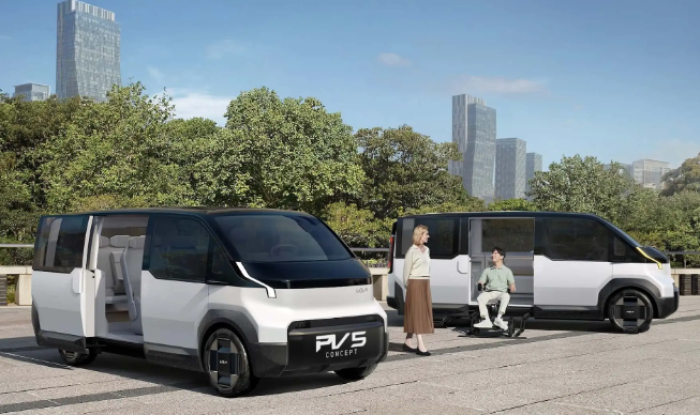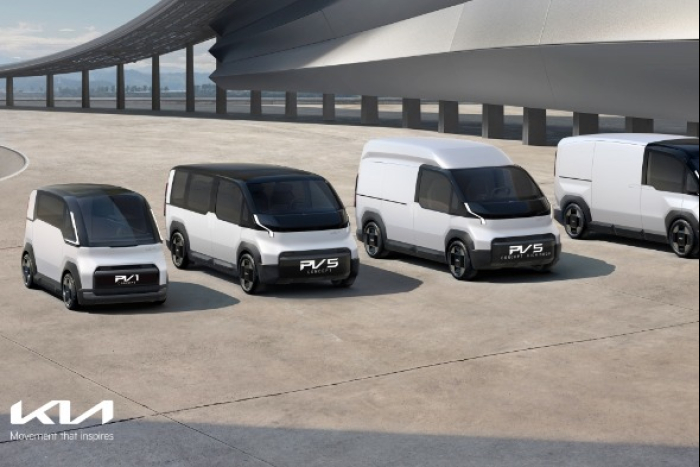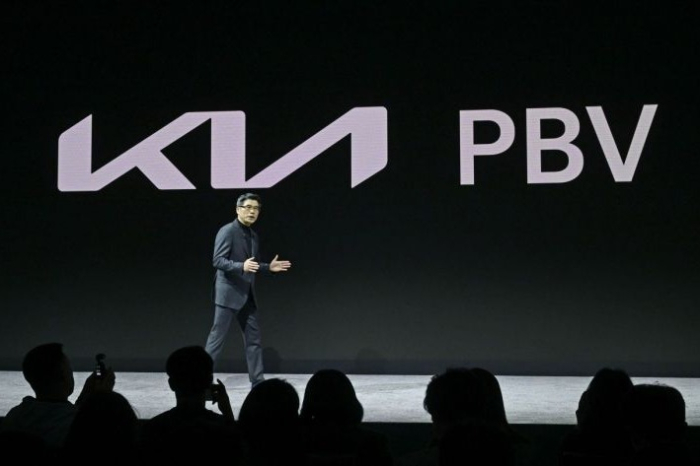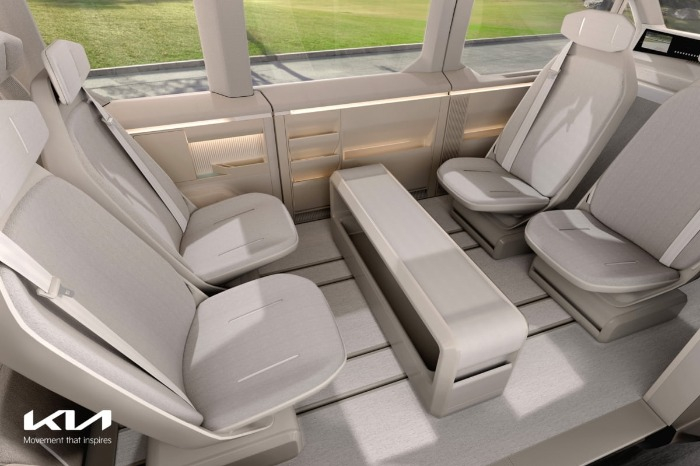Korean innovators at CES 2024
Kia to launch mid-sized purpose-built vehicle PV5 in 2025
The PBV lineup will use interchangeable life modules to customize the EVs for different purposes
By Jan 09, 2024 (Gmt+09:00)
3
Min read
Most Read
LG Chem to sell water filter business to Glenwood PE for $692 million


Kyobo Life poised to buy Japan’s SBI Group-owned savings bank


KT&G eyes overseas M&A after rejecting activist fund's offer


StockX in merger talks with Naver’s online reseller Kream


Mirae Asset to be named Korea Post’s core real estate fund operator



Kia Corp., the No. 2 automaker in South Korea, is set to launch its first mid-sized purpose-built vehicle model (PBV) in 2025 and start a customized car business in earnest.
On Monday, the Hyundai Motor Group affiliate unveiled its future core products PBV lineup, the mid-sized PV5, large model PV7 and small-sized PV1 during a media day event at the tech show CES 2024 in Las Vegas.
The PV5, Kia’s first dedicated PBV, features spacious interiors based on its electric vehicle platform and extended wheelbase. The EV’s life modules are interchangeable depending on the driver's purpose, and can thus be customized for various uses such as car-hailing, deliveries or personal recreation.
Kia will release its PV5 in several versions including Basic, Delivery, Delivery High Roof, and Chassis Cab. The company will unveil a robotaxi jointly developed with Motional, a joint venture between Kia's parent Hyundai Motor Group and Dublin-headquartered auto tech supplier Aptive plc.

PBV LINEUP
The carmaker also showcased its PV7 and PV1 at the event. The PV7 features the largest interior space among Kia’s PBV lineup and has an extended driving range on a single charge. The PV1 is optimized for short-distance logistics transport and uses a driving module to minimize the turning radius in tight spaces.
Kia will introduce self-driving tech and artificial intelligence-backed control tech to the two models, which are expected to expand its customer base to logistics firms, mobility platforms and individual drivers.
The company said it will develop the PBVs into fully customizable cars based on the driver’s preference and purposes.
“For many drivers, this will be the era when PBVs become the standard for mobility. Kia is ready to embrace all inspirations that change how we work, move and live, and we will execute what we accept,” said Kia Chief Executive Song Ho-sung.

LIFE MODULES
Kia strives to maximize innovation of the PBVs with its “easy swap” tech, which allows the drivers to easily interchange the life modules optimized for each driving purpose and to save money in not needing additional cars for different businesses, Kia said.
Kia will strengthen its PBV business and build a mobility ecosystem via partnerships with Uber Technologies Inc., Kakao Mobility Corp., Coupang Inc. and CJ Logistics Corp.
“Since our rebranding in 2021, Kia has been on a diverse journey, building a groundbreaking EV lineup, presenting a blueprint of customer-centric mobility and implementing global sustainability initiatives such as the partnership with non-profit organization The Ocean Cleanup,” said Song.
“We are now setting PBV as a key strategy for another leap forward and preparing for a full-scale transition into a sustainable mobility platform,” added the CEO.

MASS PRODUCTION
From 2025 Kia aims to manufacture up to 150,000 units of PBVs at a production complex in Hwaseong, 80 kilometers (50 miles) southwest of Seoul, with a 1 trillion won ($757 million) investment.
Last April, the company broke ground on its first PBV factory in the complex, which will be the world’s first dedicated plant for PBVs and Korea’s first factory only for EVs. It will be a smart factory using digital technologies and robotics.
The automaker is planning to build the second plant for PBVs in Hwaseong to mass-produce large electric PBVs from 2028, according to industry sources.
Write to Jae-Fu Kim at hu@hankyung.com
Jihyun Kim edited this article.
More to Read
-
 Electric vehiclesKia to build 2nd purpose-built vehicle plant in Korea
Electric vehiclesKia to build 2nd purpose-built vehicle plant in KoreaOct 13, 2023 (Gmt+09:00)
3 Min read -
 Electric vehiclesHyundai Motor eyes purpose-built vehicle market entry
Electric vehiclesHyundai Motor eyes purpose-built vehicle market entrySep 15, 2023 (Gmt+09:00)
2 Min read -
 AutomobilesKia scouts ex-Stellantis executive Pierre-Martin Bos as PBV director
AutomobilesKia scouts ex-Stellantis executive Pierre-Martin Bos as PBV directorJul 11, 2023 (Gmt+09:00)
2 Min read -
 AutomobilesHyundai to spend $18 bn on EVs; Kia breaks ground on first PBV plant
AutomobilesHyundai to spend $18 bn on EVs; Kia breaks ground on first PBV plantApr 11, 2023 (Gmt+09:00)
3 Min read -
 AutomobilesHyundai Group unveils purpose-built vehicle for airport pickup
AutomobilesHyundai Group unveils purpose-built vehicle for airport pickupSep 19, 2022 (Gmt+09:00)
1 Min read
Comment 0
LOG IN


